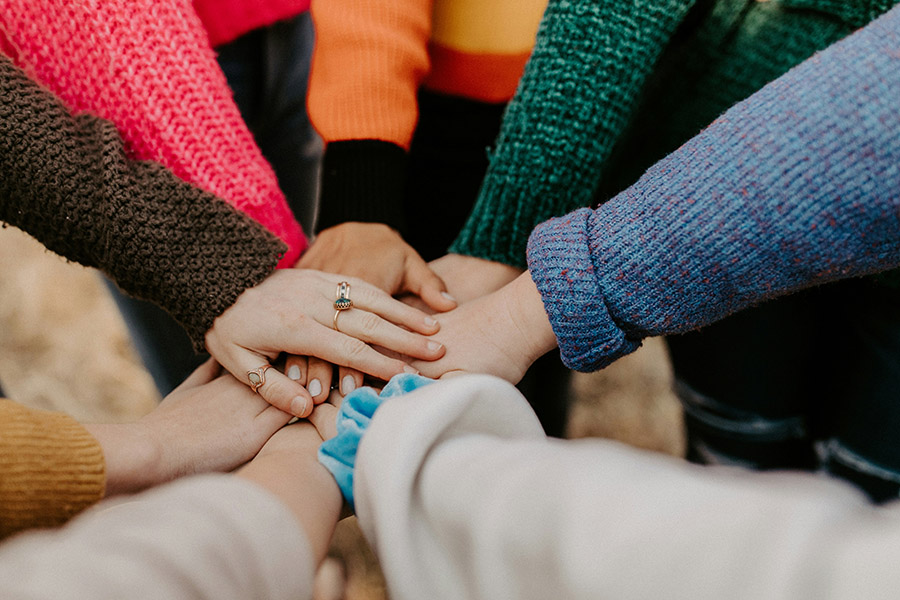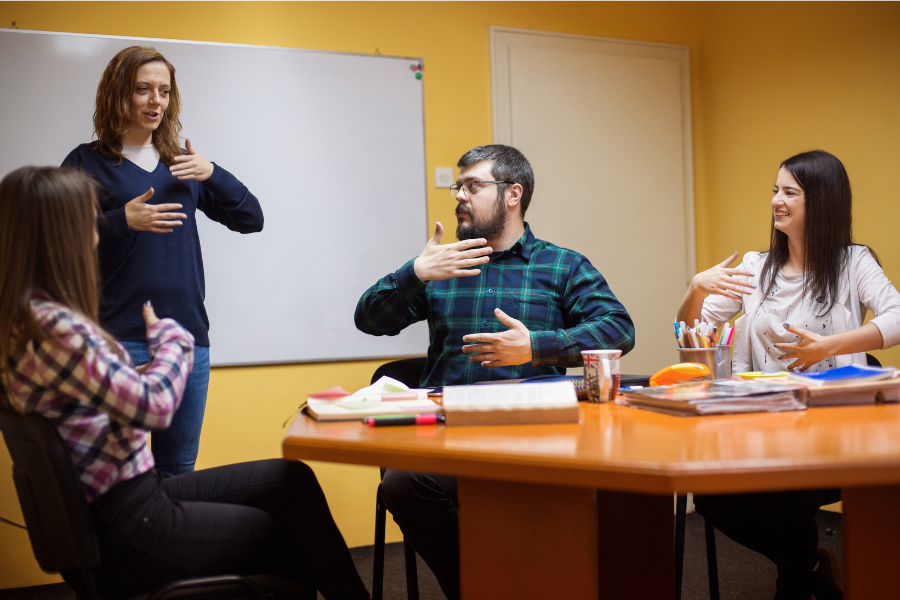10 Awesome Things You Can Do to Be an Ally for the Deaf Community (Part 1)
Table of Contents
What does it mean to be an Ally for the Deaf community?
Welcome to Part One of “10 Awesome Things You Can Do To Be An Ally For The Deaf Community.” This blog is split into two installments in order to more thoroughly discuss practical things you can do to become an ally for the Deaf community.
Ally defined: To be an ally means to commit oneself to support, advocate for, and stand in solidarity with a group or individual, often from a marginalized or an underrepresented community.
Being an ally for the Deaf community signifies a deep commitment to understanding and actively participating in the elevation of Deaf culture, American Sign Language (ASL), and the needs of Deaf individuals within society. It is a journey of continuous learning, listening, and action. The journey aims to foster genuine partnerships that contribute to a more equitable and inclusive world. This journey encompasses the Deaf community’s rich culture and identity which are integral to everyday life. Read on to equip yourself with practical steps towards becoming an effective ally for the Deaf community.
1. Educate Yourself About Deaf Culture and ASL
Like all groups of people the Deaf community has a distinct and dynamic culture. First and foremost within this culture being Deaf is something to be celebrated, a concept known as “Deaf gain.” Deaf culture asserts that being Deaf is a distinct way of life that is not to be pitied or looked down upon.
When you educate yourself about Deaf culture and ASL you will be more prepared to:
Foster Inclusivity and Respect
Educating oneself about the values, norms, and expectations within the Deaf community cultivates a deep respect for its culture. It challenges common misconceptions and stereotypes that hearing people might have about Deafness, such as viewing it as a disability that needs fixing. Understanding that the Deaf community celebrates its identity and values its language as a complete and complex system is crucial for fostering an environment of inclusivity and respect.
Support Advocacy and Accessibility
Knowledgeable allies are better equipped to advocate for the rights and needs of the Deaf community, including accessibility to services and accommodations in various settings. Education about legal and social barriers faced by Deaf individuals enables allies to champion for changes that improve the quality of life and ensure equal opportunities for the Deaf community.
Bridge Communication Gaps
Learning about Deaf culture and ASL enables allies to communicate more effectively with Deaf individuals. This knowledge not only includes the ability to sign but also an understanding of non-verbal cues and the appropriate ways to get a Deaf person’s attention. By facilitating smoother communication, allies help bridge the gap between the Deaf and hearing worlds, making interactions more inclusive and less frustrating for everyone involved.
Encourage Personal Growth
To be an ally for the Deaf community is a journey of personal growth that enhances one’s empathy, cultural competency, and communication skills. It opens up new perspectives and enriches the ally’s life with diverse experiences and relationships, contributing to a more understanding and connected world.
Through your learning and understanding of Deaf Culture you can make a meaningful difference, promoting a society where everyone is valued and understood.
2. Own Your Hearing Privilege
Owning your hearing privilege is a critical step to become an ally for the Deaf community. This involves recognizing and acknowledging the advantages one has in a society designed primarily for hearing individuals. For example, hearing individuals can easily access drive-thrus, theaters or professional services without the need to utilize ASL interpreters. By understanding these privileges, you can more effectively support, advocate for, and participate in the empowerment of the Deaf community.
When you own your hearing privilege, you will be more prepared to:
Acknowledge Unearned Advantages
The first step in owning your hearing privilege is to recognize that the ability to hear offers unearned advantages in access to information, communication, and social interactions. This acknowledgment doesn’t imply guilt but rather is an awareness of the systemic inequalities that benefit hearing people. By understanding this, you can approach your advocacy with humility and a genuine desire to support equality.
Develop Empathy and Understanding
Owning your privilege fosters empathy. It encourages allies to listen to and learn from the experiences of Deaf individuals without overshadowing their perspectives. This empathetic approach is vital in understanding the challenges faced by the Deaf community, including barriers to communication, education, and employment.
Support Self-Determination
Recognizing your privilege includes understanding the importance of self-determination in the Deaf community. To be an ally for the Deaf community means to respect and support the community’s right to make decisions about issues that affect them. This includes issues such as education, healthcare, and cultural representation. This respect for autonomy is fundamental to empowering the Deaf community.
Owning your hearing privilege is an essential part of being an effective ally. It will allow you to approach allyship with the humility, empathy, and a commitment necessary for making a positive impact in the lives of Deaf individuals. The owning of your hearing privilege leads towards a more inclusive and equitable society for everyone.
3. Challenge Discrimination
Challenging discrimination is a fundamental aspect of being an effective ally to the Deaf community. It involves recognizing and taking action against injustices and biases that Deaf individuals face, thereby contributing to a more equitable and inclusive society.
When you stand up against discrimination, you will be more prepared to:
Build Solidarity and Strengthen Communities
Standing against discrimination builds solidarity between the Deaf community and its allies. It demonstrates a commitment to justice and equality that goes beyond words, showing Deaf individuals that they are not alone in their struggles. This solidarity is essential for building strong, supportive communities that can work together to achieve lasting change.
Promote Equality and Accessibility
Taking a stand against discriminatory practices and policies encourages the development and implementation of more inclusive and accessible environments. This can include advocating for ASL interpreters, captioning services, and visual alert systems in public spaces and services. By doing so, allies help ensure that Deaf individuals have equal access to information, services, and opportunities.
Support Empowerment and Autonomy
Challenging discrimination supports the empowerment of the Deaf community by affirming their rights to self-determination and autonomy. It emphasizes the importance of Deaf individuals being involved in decisions that affect their lives, from education and employment to healthcare and policy-making. Allies who challenge discrimination reinforce the message that the Deaf community should be leading these conversations.
Raise Awareness of Injustice
By challenging discrimination, you help raise awareness about the specific challenges and injustices the Deaf community faces. Many people are unaware of the discrimination Deaf individuals encounter in education, employment, healthcare, and daily interactions. Allies play a crucial role in educating others, bringing these issues to the forefront, and sparking conversations about change.
Encourage Cultural Change
Challenging discrimination helps to shift societal attitudes and norms that have historically marginalized Deaf individuals. It questions and seeks to change the stereotypes and misconceptions that contribute to discrimination. Through advocacy and education, allies can play a key role in promoting a cultural shift towards greater acceptance and understanding of Deaf culture and ASL.
When you are an ally for the Deaf community, you are showing courage, action, and commitment to justice. By taking a stand, you can make a significant impact, supporting the Deaf community in their fight for equality, respect, and full participation in society.
4. Advocate for Accessibility and Inclusion
Advocating for accessibility and inclusion is at the heart of becoming an ally for the Deaf community. This form of advocacy not only directly supports the removal of barriers to participation but also fosters a broader understanding and respect for diversity.
When you advocate for accessibility and inclusion, you will be more prepared to:
Foster a Sense of Belonging
Inclusion is about more than just physical accessibility; it’s about creating environments where Deaf individuals feel welcomed, valued, and understood. Allies advocate for cultural competence among hearing people, encouraging them to learn about Deaf culture and ASL. This not only improves interpersonal interactions but also fosters a deeper sense of belonging and community.
Enhance Communication
Advocating for inclusive communication practices broadens the ways in which society communicates, embracing methods that cater to diverse needs. This can lead to the adoption of technology and practices that improve communication access for everyone, not just the Deaf community. For example, the widespread use of text messaging and video calls benefits a wide range of individuals, including those who are Deaf or hard of hearing.
Promote Equal Opportunities
By pushing for accessibility and inclusion, allies help ensure that Deaf individuals have equal access to education, employment, healthcare, and public services. This includes advocating for the availability of ASL interpreters, captioning services, and visual alert systems. Such efforts level the playing field, allowing Deaf individuals to participate fully and equally in society.
Challenge Stereotypes and Misconceptions
Advocacy brings visibility to the capabilities and contributions of Deaf individuals, challenging stereotypes and misconceptions that often lead to discrimination. By highlighting the achievements and voices of Deaf people, allies help dismantle the idea that Deafness is a limitation, instead showcasing the diversity and richness of Deaf culture.
Encourage Policy Change
Persistent advocacy from allies can lead to significant changes in laws and policies that benefit the Deaf community. This might involve lobbying for the implementation of more stringent accessibility standards, the recognition of ASL as a legitimate language, or the provision of resources for Deaf education. These systemic changes can have a profound impact on the lives of Deaf individuals.
Build Supportive Networks
When allies advocate for accessibility and inclusion, they contribute to building networks of support that encompass both Deaf and hearing individuals. These networks provide resources, support, and solidarity, strengthening the community’s ability to navigate challenges and celebrate successes together.
When you advocate for accessibility and inclusion you are employing a powerful means for being an ally of the Deaf community. It not only addresses practical barriers to participation but also promotes a more inclusive, equitable society where diversity is celebrated, and everyone has the opportunity to thrive. Through advocacy, allies demonstrate their commitment to standing alongside the Deaf community, working together towards a future where inclusion is the norm.
5. Foster Inclusive Spaces
Fostering inclusive spaces puts you on the path towards becoming an ally for the Deaf community. Such spaces accommodate the unique needs of the Deaf community and make the Deaf community an integral part of the broader American culture. All are valued regardless of their needs.
When you foster more inclusive spaces you will be more prepared to:
Validate and Respect Deaf Culture
Creating spaces that actively incorporate Deaf culture and ASL sends a powerful message of validation and respect. This can include hosting events with Deaf speakers, offering ASL classes, and ensuring that Deaf culture is represented and celebrated. By doing so, you as an ally for the Deaf community acknowledge the richness of Deaf culture and its integral role in the diversity of the human experience.
Promote Social Inclusion
Inclusive spaces facilitate interactions between Deaf and hearing individuals, fostering a sense of community and mutual understanding. These environments encourage open communication and learning opportunities, allowing everyone to share their experiences and perspectives. This social integration helps break down prejudices and misconceptions, promoting a more inclusive society.
Enhance Accessibility and Participation
Inclusive spaces should be designed and/or modified to be accessible to everyone, including Deaf and hard of hearing individuals. Barriers that often prevent full participation amongst all parties involved are removed. In place of these barriers, ASL interpreters, live captioning and other tools that cultivate accessibility are implemented so that everyone feels welcomed and included. As an ally for the Deaf community, you can help ensure each individual can participate by supporting the implementation of tools and technologies that enhance accessibility and participation for all regardless of their communication preference.
Encourage Empathy and Awareness
As an ally of the Deaf community you work to create inclusive spaces and cultivate an atmosphere of empathy and awareness. Such environments encourage people to consider the experiences of others and recognize the importance of accessibility and inclusion in everyone’s lives. This heightened awareness can lead to more individuals advocating for the needs of the Deaf community, thereby broadening the network of support.
Drive Systemic Change
Fostering inclusive spaces can also inspire systemic change by setting a standard for accessibility and inclusion. As more organizations, businesses, and communities see the value and feasibility of creating environments that cater to the needs of the Deaf community, it can lead to widespread adoption of inclusive practices. This domino effect can significantly impact legislation, policies, and societal norms, making inclusivity a standard rather than an exception.
Fostering inclusive spaces is a proactive way to support the Deaf community, ensuring that Deaf individuals have equal access to opportunities and experiences. It embodies the essence of allyship, combining awareness, advocacy, and action to make a positive difference. Through these efforts as an ally of the Deaf community you contribute to a world where everyone is recognized, understood, and valued for who they are.
Embracing Allyship
Embracing the role of an ally to the Deaf community reflects a profound dedication to fully comprehend and engage in uplifting Deaf culture, ASL, and the specific requirements of Deaf individuals in our society. This path is one of perpetual education, attentive listening, and proactive involvement, all directed towards cultivating authentic partnerships that drive progress toward a more just and inclusive world. Such a commitment ensures that the rich culture and identity of the Deaf community are recognized and valued parts of our daily lives.

Let’s continue our journey together!
Where do you find yourself in the ongoing adventure of allyship for the Deaf community? Let us know in the comments below!






I am a Deaf person teaching ASL courses at the University of Montevallo. This is an awesome article! I’ve shared this with my classes and colleagues. Thank you!
I ask two city and one county governments to proclaim September Deaf Awareness Month and will again this year i have helped the Baytown Visitors Center by checking the hotels in Baytown for accessibility of all disabilities including deaf and hard of hearing i am HOH